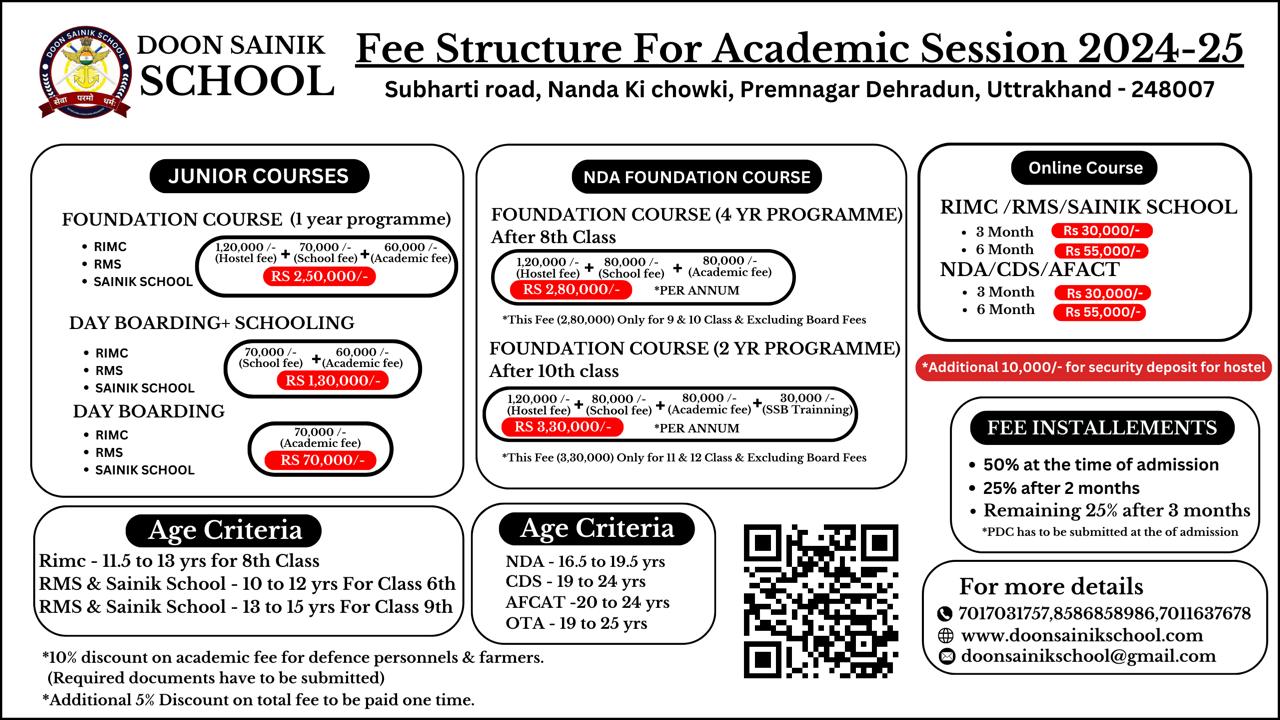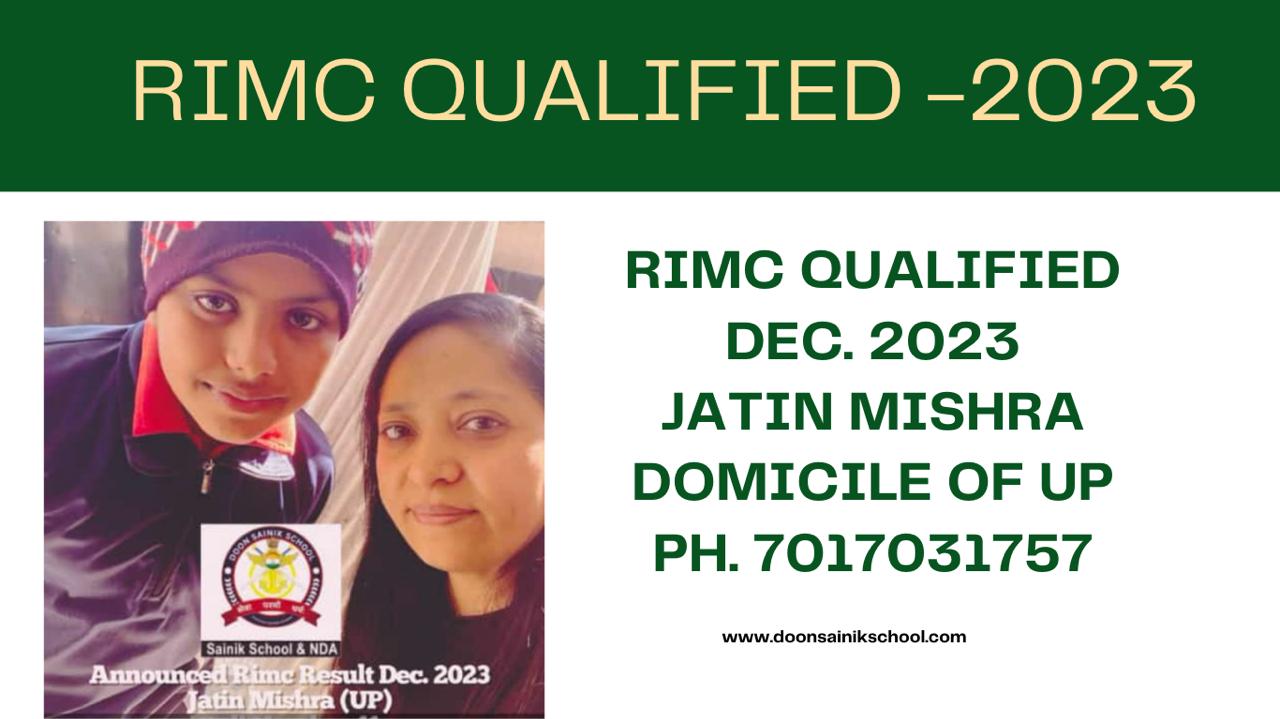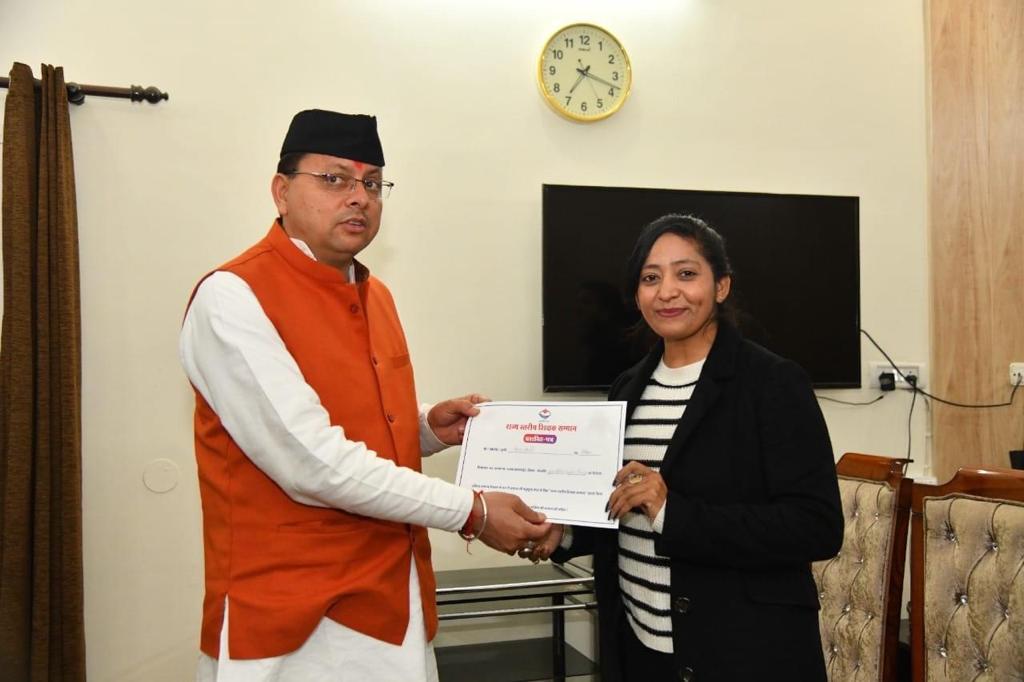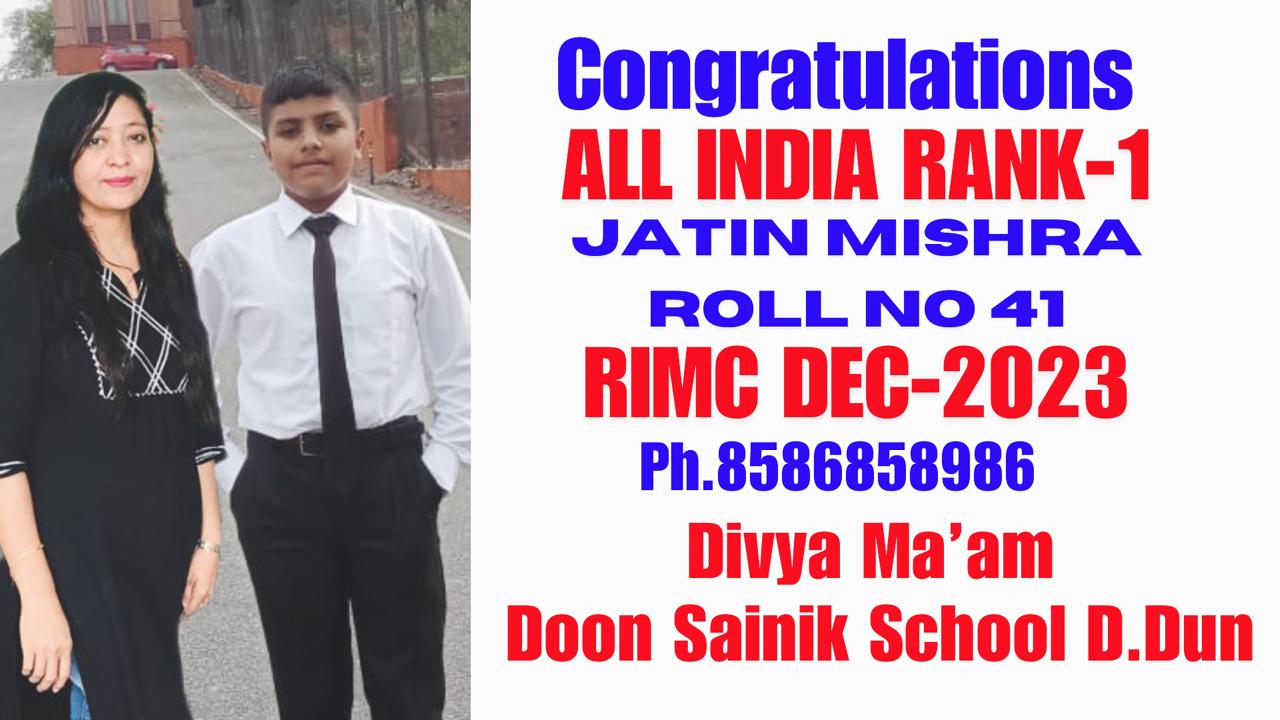
~MA (Public Administration) & B.Ed , PGCTE (Assistant Master) was honored with the National Awardfor Teachers, 2011.
~The Indian Education Award 2019 - The award was presented to her at New Delhi on the occasion of the Teacher's Day, by her Excellency, Smriti Zubin Irani is an Indian politician.
~GS Faculty for Army Cadet in KV IMA (Dehradun).
~UPSC(Civil Services) Prelims Qualified
~Grade in NCC C Certificate
~National Player in Judo & Kho-Kho
~Divya Soni, director of Doon Sainik School, is currently the course mentor of 42 brigade HRDC unit of army education Corps Ex-senior Faculty of RIMC. Till end of November 2021 the learned and experienced faculty of Doon Sainik School have been the course mentors of the fore NDA batch in KV IMA.
Divya Madam Read More..
RIMC Overview
The Rashtriya Indian Military College, also known as RIMC and formerly known as the Prince of Wales Royal Indian Military College, is an Indian military school for boys and girls that is located in Doon Valley, Dehradun. The National Defense Academy, Indian Naval Academy, and ultimately the Indian Armed Forces all receive their training at the RIMC. Rimcollians—the term used to refer to RIMC graduates—have gone on to assume the top positions in the armed forces of Bangladesh, Pakistan, and India.
RIMC offers education up to Class XII and is associated with the Central Board of Secondary Education (CBSE). The course of study combines academic material with military instruction, physical conditioning, and recreational activities. The college also places a strong emphasis on its students’ leadership, discipline, and patriotism. A written test, a physical exam, and a personal interview are the criteria for admission to RIMC. Scholarships and financial aid are provided to students who are admitted to help with their educational costs.
RIMC has produced a number of accomplished former students who have had a substantial impact in a range of industries, including business, politics, and the military. The college continues to draw some of the best and brightest young minds in India because of its rigorous training and disciplined educational philosophy.
The Rashtriya Indian Military College (RIMC) alumni are a prestigious group of people who have made important contributions to a variety of sectors, including education, politics, business, and defense. Some RIMC graduates have achieved success in a variety of professions, including engineering, law, medicine, and athletics, while others have gone on to become senior officers in the Indian Military Forces.
Here are some notable alumni of RIMC and their success stories:
Manohar Parrikar:
Manohar Parrikar, a well-known RIMC alumnus, had a great political career in India and made important contributions to the growth of the nation. He held the position of Goa’s Chief Minister twice, during which time he was instrumental in the implementation of numerous programs aimed at enhancing the state’s infrastructure, infrastructure, and public health. Parrikar previously served as India’s Defense Minister, where he was instrumental in boosting the nation’s defense capabilities and updating its armed forces.
During his time in office, he oversaw the execution of various important defense initiatives, such as the “Made in India” program, which intended to support domestic defense manufacture. Together with his contributions to administration, Parrikar was a steadfast supporter of honesty and openness in government. Many young Indians are still motivated by his legacy to enter the political and public service fields because of his reputation for moral character, honesty, and dedication to the common good.
Air Marshal Pradeep Vasant Naik:
In the Indian Air Force, Air Marshal Pradeep Vasant Naik had a noteworthy career (IAF). He was the IAF’s Chief of the Air Force from 2009- 2011 and was instrumental in strengthening the nation’s air defense capabilities. He was in charge of modernizing the IAF fleet and creating new defensive technology during his time there. He was a fervent supporter of women’s suffrage in the armed forces and was instrumental in advancing gender equality in the IAF.
Air Marshal Naik kept working as a strategic adviser and consultant after he left the IAF, which allowed him to continue making significant contributions to the nation’s military industry. He has received many awards for his exceptional service, including the Vayu Sena Medal, the Ati Vishisht Seva Medal, as well as the Param Vishisht Seva Medal. Many young people in India are still motivated to work in the military industry by his reputation as a visionary leader and accomplished aviator.
General Bipin Rawat:
General Bipin Rawat is a well-respected RIMC alumnus who served with distinction in the Indian Army. From 2016 until 2019, he was the Indian Army’s Chief of Army Staff. He was then named the country’s first Chief of Defense Staff. In order to strengthen the nation’s military capabilities and modernize the armed forces, General Rawat was crucial. He managed various important projects, including as the adoption of modern defense technologies and the development of India’s international alliances.
General Rawat was a leading proponent of inclusivity and diversity in the military as well as a steadfast supporter of gender equality in the armed services. He received a number of significant medals and distinctions for his exceptional service, including the Param Vishisht Seva Medal, the Ati Vishisht Seva Medal, and the Yudh Seva Medal. Young people in India are still motivated to work in the military industry by his reputation as a visionary leader and devoted defender of the nation’s interests.
Lt. Gen. Bobby Mathews:
In 2009, he became the first RIMC alumnus to hold the position of RIMC Commandant. A well-known RIMC alumnus who achieved success in the Indian Army is Lt. Gen. Bobby Mathews. He held the position of Director General of Military Operations and was an important participant in a number of crucial military actions, including the Kargil War in 1999. Lt. Gen. Mathews was in charge of organizing and carrying out counterinsurgency operations in Jammu and Kashmir throughout his time in office.
He played a significant role in enhancing the skills of the Indian Army in this area by contributing to the development of fresh plans and techniques to combat insurgency. Lt. Gen. Mathews was a staunch supporter of the welfare and security of service members and their families. After leaving the Indian Army, he worked as a strategic advisor & consultant, continuing to have a significant impact on the nation’s military industry. His reputation as a capable military tactician and devoted protector of the nation’s interests continues to encourage young Indians to work in the defense.
Major Somnath Sharma:
During the 1947 Indo-Pakistani War, Major Somnath Sharma, a valiant RIMC alumnus, significantly aided the Indian Army. For his valiant actions at the Battle of Badgam in Kashmir, he was the first recipient of the Param Vir Chakra, the highest military honor in India. Major Sharma led his forces in battle against an enemy force that had a numerical advantage, yet he managed to maintain his position despite suffering significant losses.
Despite suffering severe injuries during the conflict, he persisted in fighting till his demise. Inspiring his fellow soldiers with his courage and tenacity, Major Sharma was a major factor in India’s triumph in the war. Generations of Indian youth are still motivated by him as a brave soldier and a great patriot. Major Sharma gave his life in the line of duty for his nation, and generations of Indians are still inspired by his bravery and courage. His reputation as an icon of the Indian Armed Forces continues to play a significant role in India’s military past.
Ritwik Bhattacharya:
Indian squash player Ritwik Bhattacharya is well-known for his contributions to the game. On October 14, 1978, he was born in Kolkata, India. Ritwik has had a distinguished career spanning more than 20 years. He has competed for India in a number of international competitions and has won multiple individual and team championships. He has established himself as one of India’s best squash players thanks to his commitment to the game and his remarkable on-court abilities.
He still motivates new sportsmen to excel in their sports and lives by encouraging them to follow their passion for squash. Ritwik is not just a successful squash player, but he is also a well-respected instructor and role model for young squash players. He is devoted to developing new talent and to advancing the sport in India. The RIMC graduates have achieved great success in their respective industries, and their success tales are evidence of the high caliber education and training that RIMC offers. We are motivated to pursue perfection in all facets of our lives by their successes.
Conclusion
Some of India’s best leaders, military personnel, and athletes have come out of the Rashtriya Indian Military College (RIMC). Graduates of RIMC have developed strong leadership qualities and character as a result of the demanding training, discipline, and ideals instilled there, positioning them to serve their country with honor, bravery, and distinction.
Future RIMC cadet generations will be motivated by these success stories, which also highlight the value of putting in a lot of effort, being persistent, and having a clear sense of why one is doing something. The legacy of RIMC continues to encourage young Indians to seek jobs in the military industry and other disciplines, having a positive influence on both India and the rest of the globe.
Top RIMC Boarding School
RIMC or Rashtriya Indian Military College is a reputed public school situated in Doon Valley, Uttarakhand. Dehradun city is known for best schools and RIMC is one among those schools. Doon Sainik School provides best RIMC Coaching in Dehradun to make child future in Defence.RIMC is one of the finest schools in Dehradun in terms of infrastructure, education system and discipline. RIMC came into existence in 1922. RIMC has made various success stories in different fields such as Defence, Ambassador, Governors etc. The primary objective of RIMC is to choose the best candidates for NDA/ NAVAC.
More info...Activities
The Doon sainik school lays stress on sports for the overall physical and mental development of all students.Sports activities like football, Swimming pool, handball, kho-kho, and badminton and PT form an integral part of the school routine. Indoor sports facilities in our hostel consisting of carrom, chess, etc, also exist in the Classes. The school Kingston also has a well-maintained athletic track, football, volleyball, and basketball grounds.Cadets get a chance to participate in various Inter School, Inter Section, District Level Swimming Competition. College has a full Olympic Size Swimming Pool, with a 10 meter Diving platform.
More info...Day Boarding School
Day boarding school comes under one of the best schools in India. Many students wish to get admission in the school to fulfil their dream of getting success in different fields such as Engineering, Medical, teaching etc. The school offered facilities for a comfortable stay of the students and their peaceful study. It provides a great opportunity for those students who want join Day boarding school Coaching in Dehradun and also help financial help for their studies. The education in day boarding school in Dehradun is free including boarding, uniforms, books & notebooks etc.
More info...











